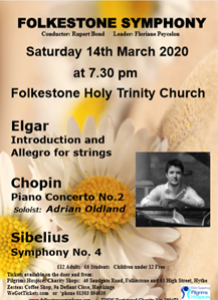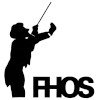Saturday 14th March 2020

Elgar - Introduction & Allegro for Strings
Sibelius - Symphony No. 4
Chopin - Piano Concerto No. 2
(Soloist - Adrian Oldland)
Holy Trinity Church
Sandgate Rd
Folkestone
CT20 2HQ

Review
Folkestone Symphony always provides its audience with a feast of worthwhile orchestral music. As a musical meal, the main course of the concert on 14 March was undoubtedly the Sibelius Symphony 4, its ‘meat’ being particularly strong stuff. The Elgar was an attractive and substantial starter, while the Chopin concerto formed a sweet soufflé, relatively light in substance. The chef, conductor Rupert Bond, gave the impression of knowing exactly how the audience’s taste buds should be excited. If the kitchen staff, the orchestra’s players, were occasionally overstretched, or sometimes went astray, this hardly detracted from a very worthwhile experience. The customers, slightly less numerous than at this orchestra’s other recent concerts probably due to the developing coronavirus epidemic, were in a good tipping mood as they departed.
Among the orchestra there was more than a sprinkling of professionals or semi-professionals and instrumental teachers. This showed, in particular in the impeccable tuning of the woodwind and the ability of the brass to play warmly without blasting. But the responsibility for delivering much of the music fell on the orchestra’s string section. In terms of numbers this is large, though in the Holy Trinity acoustic more double basses are needed to achieve a satisfactory balance.
The Elgar was delivered with passion and, when appropriate, the unison passages carried real weight and fervour. The scoring is often ingenious and displays the composer’s practical knowledge of what works, gained as a young player in the orchestra of the Three Choirs Festival. However, for this piece Elgar had in mind the high standard of London professional musicians. So, while the complex passagework was often brought off excitingly well, in this performance just occasionally a lack of uniformity among the upper strings led to smudged articulation and tuning problems, such as at the start of the Allegro. Nevertheless, these were passing imperfections in this convincing performance, and soon forgiven.
The first movement of the Sibelius Symphony No 4 started with impressively sonorous lower strings, not quite matched in purity of intonation later by the upper strings in their often searing lines. Here there were many characterful wind solos. The complex time shifts of the second movement were negotiated particularly well under Mr Bond’s clear direction. The highpoint of the symphony came in the third movement, with impressive tutti strings, a heart-felt lament, good balance across the orchestra even when fortissimo, sweet-sounding woodwind, and a well-blended brass choir. The last movement had furious energy and was motor-driven in a typically Sibelian way. While rough edges and accidents were in evidence in this fourth movement, overall the impression was given that this is great music. All that was needed to bring it even more alive was for the players to believe it.
In the Chopin concerto the soloist, Adrian Oldland, had no difficulty in dominating the texture, projecting easily on Holy Trinity’s newly-acquired Yamaha piano even in the quieter passages. After the interval the house lights helpfully remained up, dispelling much of the gloom that had afflicted the concert’s first half, and that had cast the conductor into darkness when viewed from the audience. The strings took some time to agree their tuning in the opening tutti but soon settled into their supporting role. The star of this piece is clearly the piano soloist, and Adrian Oldland delivered splendidly. In the second movement the orchestra did all that was required of it efficiently. In the third fun came to the surface, and the band sounded confident, though always well balanced with the piano. Only very near the end did the orchestra’s alertness falter a little, understandable in light of what had been a very demanding concert for the players but a rewarding one for the audience.
Berkeley Hill
